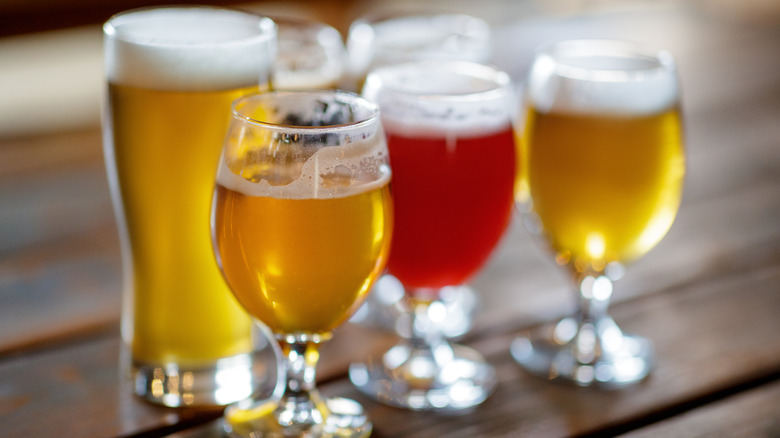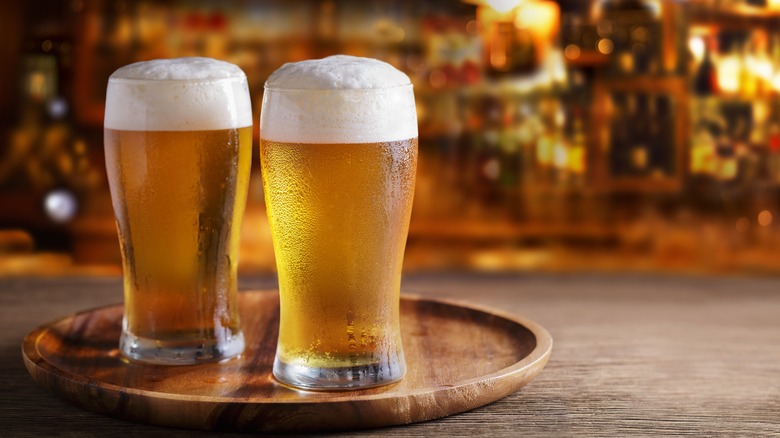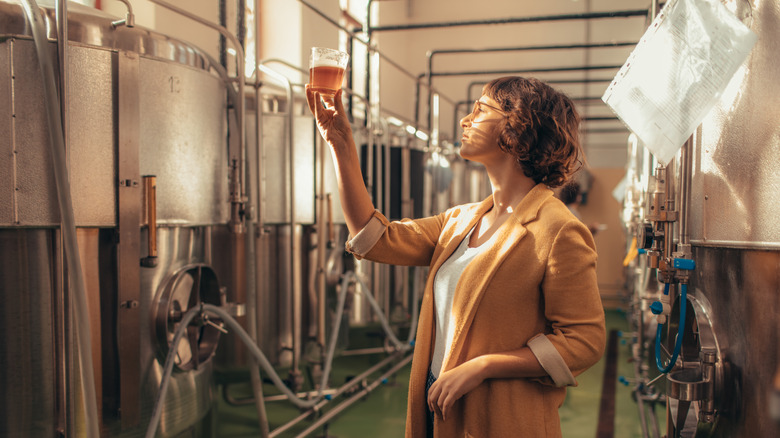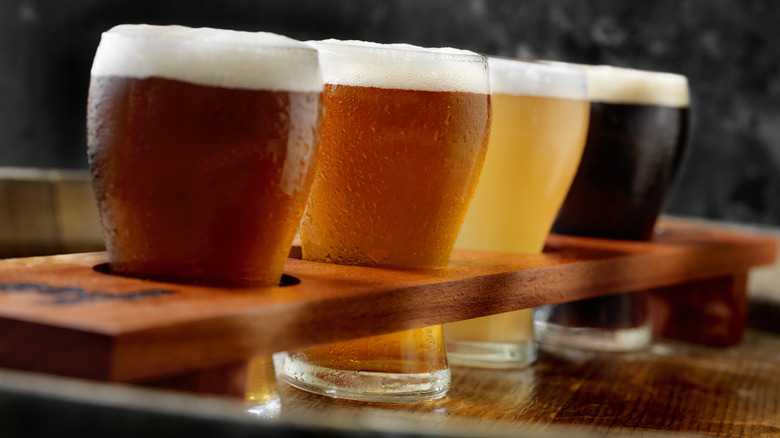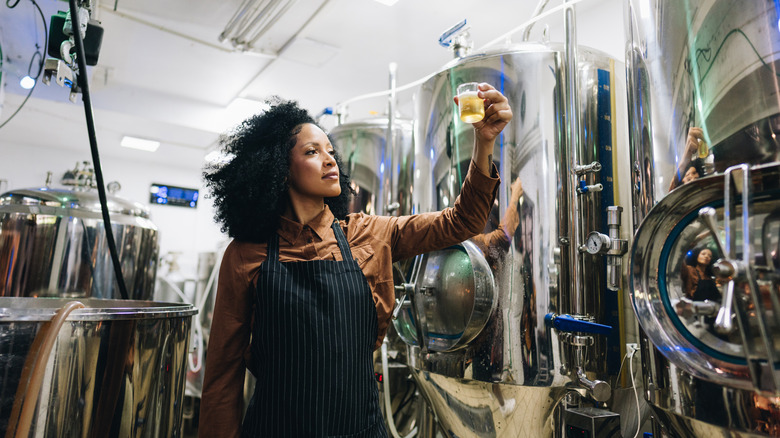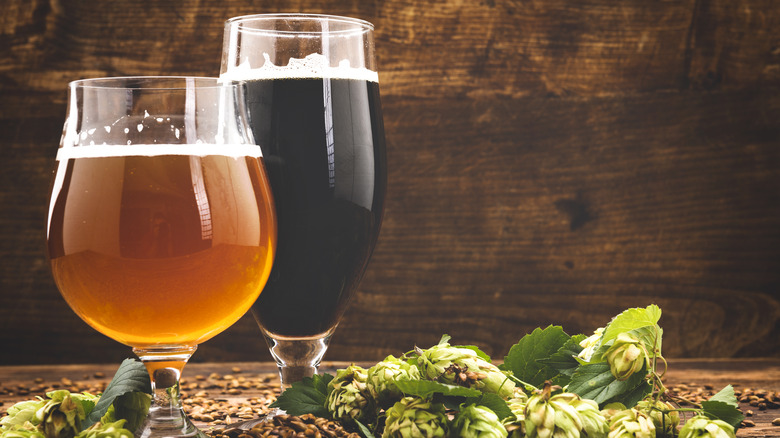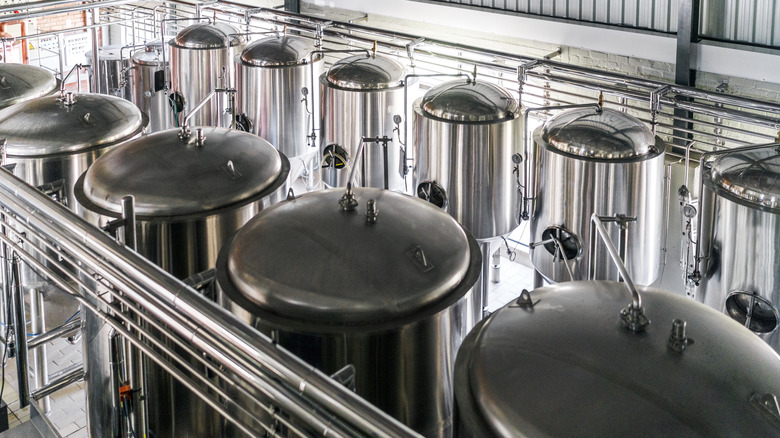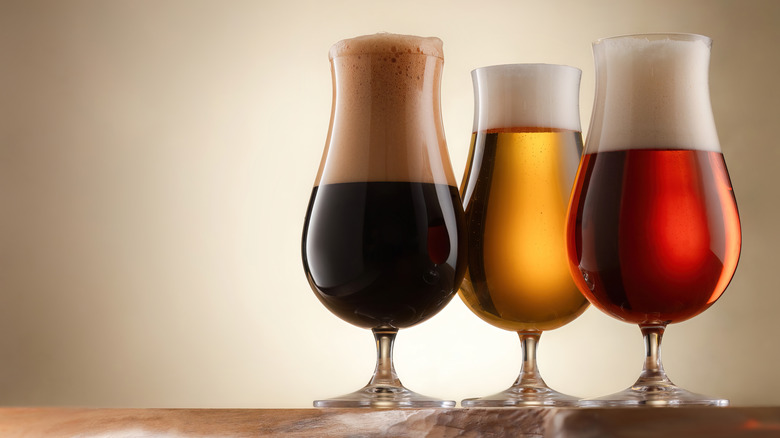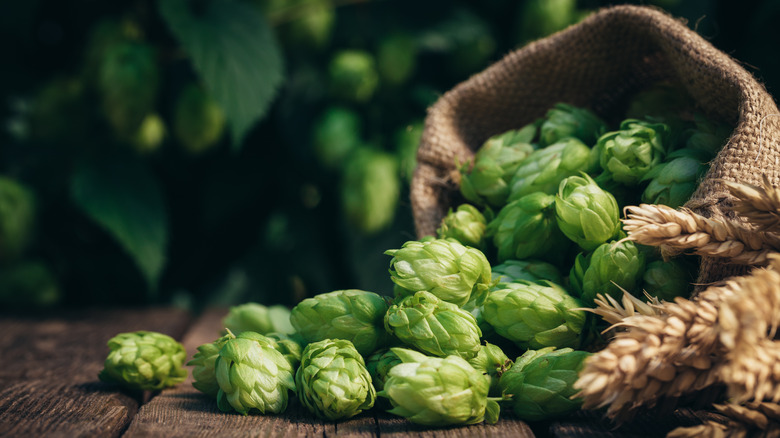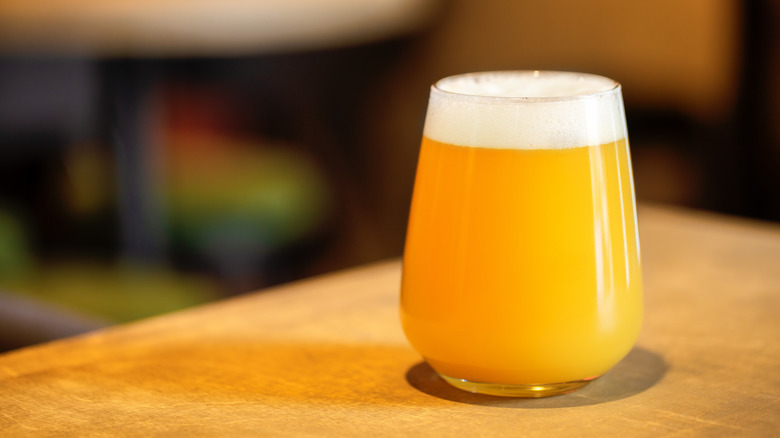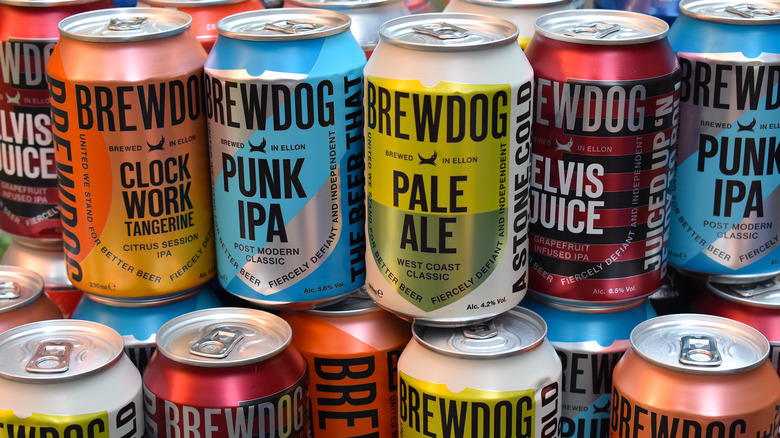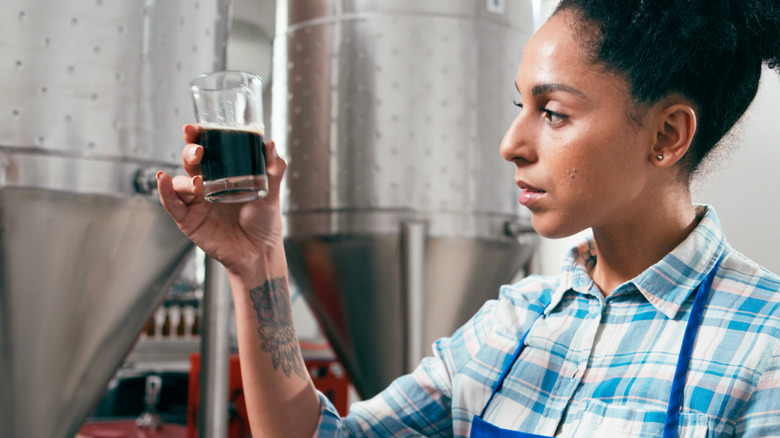Experts Reveal What Beer Companies Don't Want You To Know
Beer has its origins thousands of years ago, when it was primarily used for ceremonial purposes. It's come a long way since then, with numerous types of beer available in bars and on supermarket shelves. You might believe you're well-versed in all things beer, but there are some facts that beer companies don't want you to know. From unexpected ingredients to troubling business practices, the world of beer isn't all fun and games.
I'm into beer and have put in time as a bartender, but I wanted to get the inside scoop from experts in the industry. I spoke to an award-winning craft brewer and the owner of a boutique distributor of beer, wine, and spirits to learn some beer company secrets. Some of them might surprise you and others might make you think twice about which beers you choose in the future.
It's a big, wide world of beer out there and it's important to know what you're buying to make informed decisions. Learning a bit about what beer manufacturers do behind closed doors is valuable. Armed with this knowledge, you might decide it's time to find a new favorite beer.
Not all beer is vegetarian
You might be surprised to know that your beer of choice possibly isn't vegetarian. It's not uncommon for beers to contain a non-vegetarian fining agent called isinglass. "Isinglass is derived from fish bladders and is added to beer to help remove suspended particles, resulting in a clearer appearance," says Mario Perez, CEO and founder of House of Wine, Beer, and Spirits in Palm Beach, Florida.
However, it isn't as common a way of clarifying beer as it once was. "These days, there are a range of options for beer clarification," says Chris Gonzales, director of brewery operations at Three Weavers Brewing Company. "At Three Weavers, finings are used during the brewing process, but post-fermentation, our method of final clarification is centrifugation," he says. So, these days, more beer is vegetarian than it used to be.
However, if you avoid all animal products, there are more ingredients you'll want to be careful about. Learning everything there is to know about vegan beers can seem daunting, but there aren't too many non-vegan ingredients you need to be aware of. One is lactose, which comes from milk. It's often added to stouts and porters to make them feel creamier. Honey is another potential additive in a range of beers, but it will often be listed as a selling point. And if you've heard of oyster stouts — yes, they really contain oysters.
Beer companies don't have to list ingredients on the label
"In the United States, beer companies are not currently required by law to list the ingredients on cans or bottles," says Perez. If you're the kind of person who likes to know exactly what goes into the food and drink you consume, you might be disappointed to learn this. It's particularly problematic if there are ingredients you're allergic or intolerant to, making beer-buying a bit of a minefield. It also lets beer companies slip in ingredients that you might not be especially gassed about.
While it isn't a legal requirement, you may still find beers with ingredients listed. According to Gonzales, "some craft breweries choose to include it for the sake of beer education or listing specialty ingredients such as fruit, new hop varieties, products, etc." So, not only will you find the ingredients on some cans or bottles, but you might also learn what hops are used in production or get information about flavors, notes, and brewing style. This is a bonus if you're a big beer fan or you want to learn more about your favorite styles.
Some beer contains corn syrup
There's an ingredient lurking in some beer that you might not be expecting: corn syrup. The very same sweetener that has stirred up controversy in the world of soda has found its way into your brew. You might not like the idea of your beer containing a potentially problematic sweetener, but it's not as sinister as it sounds. Brewers use corn syrup during fermentation to feed the yeast which turns it into alcohol. By the time your beer reaches the bottle, most of the corn syrup is gone, so you won't really find much, if any, in the finished beer. It isn't used as a sweetener, just as a food for yeast.
However, the debate rages on. Critics argue that using corn syrup is a shortcut, which may hint at cheaper ingredients and a departure from traditional brewing methods. Some beer fans turn their noses up at it, and instead prefer the purity of barley and hops without ingredients of the sort added into the mix. There's also the health-conscious crowd, wary of anything linked to high-fructose corn syrup.
Corn syrup in beer might not be inherently bad, but it does tap into larger discussions about food additives, quality, and tradition. It's up to you to choose whether it's something you're concerned about or not. Either way, knowledge is power, and now you're a bit more informed for your next beer run.
Some beer contains coloring
You might think the golden amber or deep brown hue of your beer comes from the natural brewing process. Usually it does, but sometimes beers contain added coloring. Caramel coloring is the most common, and it's generally found in dark beers as an alternative to using dark malts. The downside is that colorings don't give beers the same flavors as the natural ingredients or processes that usually produce these shades. So, a beer that's naturally dark will have a richer, more complex flavor than one that's only dark because of the inclusion of caramel coloring.
Another option brewers have is using smaller amounts of coloring to achieve a uniform color across batches, making up for inconsistencies in ingredients or the brewing process that can lead to slight color differences. This could be a sign of a brewery that cares more about a product that maintains an identical appearance rather than flavor. The precise color shouldn't matter as much as a consistent flavor and quality between batches.
Salts are sometimes added to the water used to brew beer
"I think one thing that might be surprising, or that people don't often consider, is the manipulation of the water and using salts like calcium chloride or gypsum to dial in certain profiles for certain beers," says Gonzales. An average beer contains just barley, water, hops, and yeast. You might have already considered how other ingredients play a role in the flavor profile of the finished beer, but what about water? You probably think that any water is fine to use for brewing, but its mineral content actually matters.
Or, maybe you've already considered that breweries would think about water quality but you've assumed there's just one prime type of water for making beer. "I think the assumption is that breweries use the 'best' water for brewing, when it's really more accurate to say that breweries use the best water for the style," Gonzales notes. There are various salts and minerals that can be added to water and some of them encourage certain flavor profiles. For instance, calcium chloride is often added to water used to make malty beers to make them smoother, while gypsum helps accentuate hoppiness and might be used in hop-forward beers, such as IPAs.
Craft beer and beer from big brands are two very different things
There are all kinds of myths about beer that you should stop believing, but a big one is the idea that all beer is pretty much the same. There's a huge difference between craft beer and beer from big brands. It's a bit like the difference between American cheese and an aged blue cheese produced by a small manufacturer; they just don't compare. That's not to say there isn't room for both — some people love American cheese and sometimes it's exactly what you want on your burger — but one has objectively had more care and attention put into making it.
"Typically, big brands are really good at efficiency and making something cost effective," says Gonzales. "There's some impressive technology behind this kind of consistency, but it's completely different from the mentality of craft brewers," he remarks. "In my mind, craft beer starts with quality being the top priority. Using the best ingredients and best methods to make the best beer you can."
Perez agrees that craft breweries "often prioritize using high-quality ingredients, traditional brewing techniques, and hands-on craftsmanship." Of course, there are some craft breweries that are more in it for the money than the love of beer. "Go out in your local scene and hop around, have a conversation with your bartender, brewer, or brewery owner and taste the beer," Gonzales suggests. "You'll know who's cashing in and who's cool."
Some beer companies don't brew their own beer
Here's a twist you might not be expecting: Some beer companies don't actually brew their own beer. Instead, they engage in what's known as contract brewing. This is when one brewery hires another brewery to brew its beer. It's like hiring a ghostwriter to pen an autobiography, but in this case, the autobiography is a hoppy IPA or a chocolatey stout. The brewery doing the hiring often provides the recipe, vision, and sometimes even the ingredients, while the contract brewery handles the actual brewing process.
Why would they do this? The reasons are as varied as the beers. Maybe the brewery taking out the contract has full tanks and can't keep up with demand. Sometimes, it's about leveraging the advanced technology and expertise of the contract brewery to achieve a consistent quality that's hard to maintain in smaller operations. Occasionally, supermarkets use contract breweries to sell beer under their own brand labels without having to take up brewing themselves. For instance, there are various brands behind Aldi's beer lineup.
Inside the industry and among consumers, there's often snobbery surrounding contract brewing. Some people assume the breweries that are contracting others to make beer don't know what they're doing and are just in it to make a buck. While there may sometimes be truth to this, there are many valid reasons for hiring a contract brewer and plenty of great beer is made in this way.
There's more to beer beyond lager and IPAs
If you think the beer world begins and ends with lager and IPA, it's time to get out of your rut. There are plenty of craft beers for people who hate IPAs — but even those of us who love them could use some variety in our lives. Even if you regularly return to your favorite lager or IPA, you might find a new beer to add to your rotation. "Some popular options include stouts, porters, wheat beers, Belgian ales, sour beers, and barrel-aged beers," says Perez. "For someone looking to branch out, I would recommend trying a Belgian Tripel, a classic German Hefeweizen, a rich and roasty stout, or a tart and refreshing Berliner Weisse."
But if you don't want to go too far from your comfort zone, there are plenty of variations you can try outside your usual picks. "Generally speaking, lager is my favorite category of beer, but within that category, there's a ton of variation," says Gonzales. So, even diehard lager lovers can try something new. "Schwarzbier is a great (and delicious) example. Although it's a dark beer, it has a much lighter body than a stout, not roasty, and should drink like a pilsner," notes Gonzales. "I also love a good, slightly smoky lager," he adds. "Smoked Helles Lager on the menu? Yes please!"
The choice of hops in beer matters
As a craft beer brewer, Gonzales knows all about hops, and the quality matters. He also notes there are many choices out there and likens them to spices used in cooking. Brewers will have a certain flavor profile in mind and use the right hops to help them achieve this. "Hops come in a wide range of flavors — from piney and woody, to dank and pungent, to juicy and tropical," he says. "We use these different hop varieties to make the beer we're picturing."
But, it's not always as simple as choosing a hop variety and sitting back, sure of the results you're going to get. "The same hop variety can have variation like any other raw ingredient, so smelling hop samples and selecting lots from a broker or farm can help ensure that you not only get the profile you want, but also the consistency you want throughout the year," Gonzales adds.
If you're feeling overwhelmed by the world of hops, you're not alone; it can take trial and error to figure out. It's not essential to know what hops you like best, but it can help you find a beer you love. El Dorado is one of Gonzales' favorites. "It's tropical, bright, fruity — just a fantastic hop that can be used across different beer styles." He also likes Simcoe and describes it as "a hop that's citrus forward, slightly piney and woody."
The haziness of a beer doesn't directly affect the flavor
Into hazy beers? Well, you might be interested to know that haziness doesn't necessarily affect the flavor. "Haziness is a byproduct of the ingredients used in these beers," explains Gonzales. "Hazy IPA recipes are built with malt that contains a lot of protein, like wheat and oats. That helps not only the appearance, but also the body of the beer. This, in combination with the right yeast, gives you that hazy appearance."
Perez notes that "the haziness does not directly affect the flavor," but explains, "it is often associated with a fruitier and less bitter taste compared to clear beer." So, it's not that the haziness causes this juicy taste, more that hazy beers tend to be made in a style that prizes this flavor profile. You could just as easily find a clear beer that was similarly fruity or a hazy beer with a bitter or piney flavor.
That said, hazy beers generally have minimal bitterness and big, juicy tropical hop profiles, according to Gonzales. He notes that they're often the opposite of what you'd expect from West Coast IPAs. This flavor profile is "something that most consumers have come to love and expect from their local brewery," says Gonzales.
Some breweries engage in questionable business practices
Beer companies certainly don't want you to know about some of the questionable — or sometimes downright illegal, unethical, and shocking — practices that happen in certain sections of the industry. We aren't saying that all brewers are unethical. Far from it. There are so many small craft brewers doing great things. However, we also know of several companies that need to clean up their practices.
For instance, Heineken has been accused of some terrible practices in Africa. There was so much material to work with that Olivier van Beemen, an investigative journalist from The Netherlands, wrote a whole book about it called "Heineken in Africa." The book details many awful alleged practices linked to the brand, including complicity in the Rwandan genocide, widespread abuse of female Heineken employees in Africa, and a case of fraud that could have landed a Dutch CEO in jail in Nigeria for seven years had Heineken not settled for a vast sum.
The brand BrewDog, which has cornered a large chunk of the craft beer market in some parts of the world, has also been linked to controversy. First off, in 2015, it made an advert that many claim was transphobic, among other offenses. Later, in 2021, an open letter from 61 former BrewDog employees claimed the company created a toxic work culture that affected mental health and cut health and safety corners. That's not the image any business wants to portray.
Craft beer brewing can be a boys club — but brewing used to be dominated by women
The craft beer industry is dominated by hipster bros with big beards and vintage Bon Iver tees. It might seem like they'd have progressive politics and opinions, but women and non-binary people in the industry say that it's often a boys' club. Men in craft beer have been accused of bullying, harassing, and discriminating against anyone not of their gender.
But, it wasn't always this way. In fact, there was a time when women were far more prominent in brewing than men. From the 1300s until the 1700s, ale was the most common drink, as water wasn't reliably safe. Ale, which was sterilized during the brewing process, was drunk pretty much universally. People, including children, drank small ale throughout the day, which had a negligible alcohol content (although, there was also stronger beer available).
Ale was seen as largely domestic, like cooking, and therefore was considered women's work, giving rise to huge numbers of female brewers. While some were married, many weren't. It was one of the few occupations back in the Middle Ages that gave women a reliable income and a chance at independence without the need to marry. Female brewers were known as alewives, but eventually, it stopped being seen as a suitable profession for women and most were driven out of the trade by the 1400s. It's more than time for a comeback.
